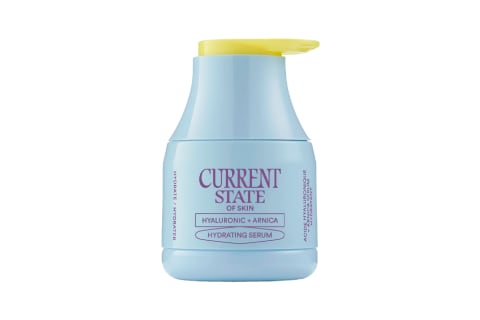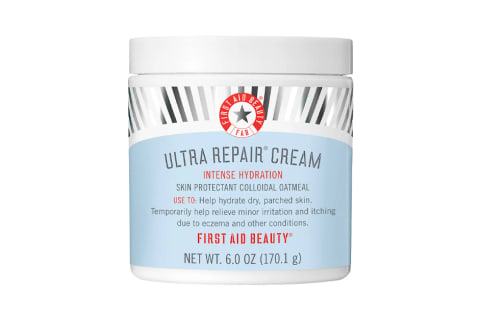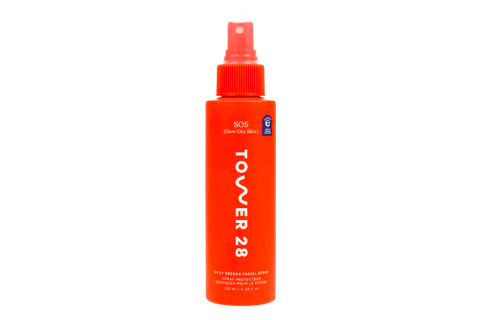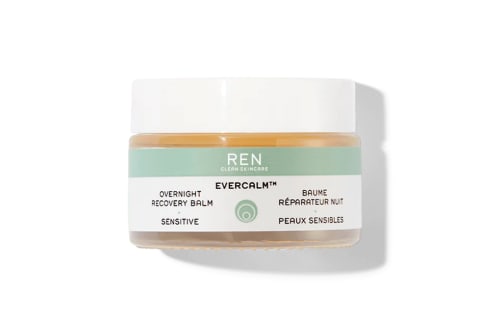Advertisement
Blotchy Skin: Causes, Solutions & Products To Help, From Derms

Blotchy skin can be somewhat of a mystery. Is it rosacea? Is it a rash? Did you overexfoliate? Unfortunately, finding out the cause of sudden red patches isn't as easy as we'd like it to be.
That being said, education is the first step. Below, a few common causes of blotchy skin and how to soothe your complexion stat, from experts.
What is blotchy skin, and what does it look like?
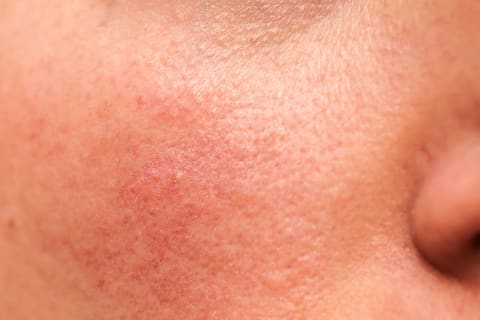
"Blotchy skin can appear as an uneven skin tone with red, brown, and even white patches with dilated blood vessels," explains board-certified dermatologist at Schweiger Dermatology Group in NYC Gloria Lin, M.D., FAAD.
She adds, "Depending on the underlying cause, it may also have raised bumps or dry scaly skin associated with it." When examining your blotches, make sure to note if they're raised or not because that's a key difference between many of the following causes.
The good news: "Many cases of blotchy skin are temporary and could be brought on by exposure to outside influences (e.g., the sun, stress, cold or hot temperature, exercise, sauna, etc.)" notes dermatology nurse practitioner Jodi Logerfo DNP, APRN, FNP-BC.
Blotchy skin causes
As mentioned before, the list of causes here is anything but short. We've collected some of the most common below for reference. We'll attach a hint to each section to aid your understanding of what makes one different from the next:
Sun exposure
If you spent time in the sun over the last week (yes, even if you wore SPF), that may be a cause of blotchiness. Sunburns often won't show up looking uniform, especially if you applied sunscreen sporadically.
Hint
Flushing from alcohol
Logerfo notes alcohol as another common trigger—one that should be fairly easy to spot. The alcohol flush happens to many people, and it's not necessarily a bad thing. However, it is helpful to be aware of the possible reaction so you can be mindful of when and where you experience a skin flush.
Hint
Exercise or overheating
If your skin is on the fair side, then you probably see a bit of flushing every time you work out or start to feel hot—a normal reaction, we might add. Logerfo notes that those prone to exercise-induced flushing may also see redness post-sauna or steam room use.
Hint
Food sensitivities
Food allergies and sensitivities show up in many forms, one of which is skin flushing. This could show up as raised blotches (like hives), an itchy rash, or just redness. It may be coupled with stomach pain, bloating, or mouth tingling as well. In addition, rosacea is often triggered by certain foods and drinks, like coffee, spicy foods, dairy, and even tomatoes!
The best way to determine if food may be the culprit is to keep a food journal and note each time you flush. Eventually, you may be able to find a correlation. If not, visit your doctor for an allergy test.
Hint
Contact dermatitis
Logerfo notes dermatitis as another common culprit. You can get contact dermatitis from virtually anything, from detergents to skin care products to toothpaste to plants and more (here's a longer list if you're curious).
Contact dermatitis may also itch, peel, swell, blister, or feel hot to the touch. Sometimes dermatitis goes away within a day or so, but persistent cases can be eased with prescription-grade products, so visit your derm if you think this is the case.
Remember, the rash could show up on your face even if you didn't touch the allergen directly to this area, as it can transfer from your hands to your cheeks, lips, eyelids, etc.
Hint
Exposure to cold or wind
The cold flush is common among those with fair skin. Generally, high winds make this flush worse and may dry out the skin, exacerbating any redness that showed up to begin with. This type of blotchiness should go away soon after you enter a warmer space.
Hint
Rosacea
Board-certified dermatologist Marisa Garshick, M.D., FAAD, mentions rosacea as a common trigger, but this one will be more persistent than the rest.
While rosacea does have its own set of triggers (alcohol for some, heat for others, and so on), you'll see it flaring more often than situational causes like those above.
Hint
Acne
While acne is typically described as a bump here and there, blotchiness often accompanies pimples. Especially those with under-the-skin cystic pimples, your skin may appear blotchy due to the increased inflammation.
Hint
Eczema
Another common skin condition that can cause flushing is eczema. Any redness from eczema will also be accompanied by dryness, flaking, itch, or irritation. Your rash may be present 24/7 or flare when triggered (similar to rosacea) be it by stress, topical irritants, etc.
Hint
Dryness
Dry skin can lead to a compromised skin barrier, which may appear blotchy and red and become irritated easily. Seasonal weather changes may call for a heavier moisturizer, some natural skin slugging with botanical oils, or simply more frequent application of moisturizer.
Hint
Over-exfoliation
Ah yes, the experience too many of us share: over-exfoliation. This can happen in a few different ways: You exfoliated too many times in one week, you used a new exfoliator that was too strong for your skin, or you exfoliated on an already compromised skin barrier.
This applies to both physical (scrubs, facial cleansing brushes, etc.) and chemical exfoliants (AHAs, BHAs, peels, etc.).
Hint
Retinol reaction
Retinol is no joke, and every derm will tell you to ease into it. Why? To avoid the retinol reaction often characterized by irritation, redness, dryness, and even peeling. Similar to over-exfoliation, this could happen due to increased cadence of retinol use or the product's potency.
It's important to note that retinol can even trigger contact dermatitis, especially around the mouth (formally called perioral dermatitis).
Hint
Stress
The sole existence of stress acne should prove to you that your skin and your mental health are connected. A perpetual state of stress can cause inflammation in the body, which may show on the skin as red blotches.
Some folks even get stress rashes, which include raised bumps and may spread onto the neck and chest.
Hint
Melasma
Garshick notes that brown patches may actually be melasma. This is particularly common above the lip, on the cheeks, and down the neck and chest. Melasma is related to hormonal shifts and tends to show up around the time of menopause for those who menstruate.
Hint
Blushing
Last but not least, you just might be blushing! This can happen when you're nervous, stressed, excited, embarrassed, and so on. If it's simply blushing to blame, the flush won't last long.
Hint
Quick remedies to soothe skin fast
The most important step you can take when dealing with a blotchy complexion is to identify your triggers and avoid them as much as possible. In the meantime, rely on topical solutions to help soothe your skin from the outside. Below, a few important notes:
- Avoid exfoliants: "It is important to avoid over-exfoliation or using abrasive scrubs," Garshick says. When your skin is inflamed, it's going to be more sensitive to products like exfoliants and retinol, so set those aside if you think you're dealing with a reaction.
- Try an aloe mask: "Aloe vera has anti-inflammatory properties that help reduce redness and irritation associated with blotchy skin," says board-certified dermatologist Brendan Camp, M.D., FAAD. Be sure to use raw aloe vera gel (100% aloe vera) or extract it from the plant yourself to avoid hidden irritants.
- Use a cool wrap: "If heat is the issue, then consider using a cool wrap or water spritz and avoiding activities like hot yoga," Lin notes.
- Get a mineral water mist: "Water from mineral springs can also help calm blotchy skin because it contains fortifying minerals and antioxidants," Camp notes. Opt for something like the Avene Thermal Spring Water mist.
- Look for oatmeal extract: When shopping topicals, look for oatmeal extract or oat oil. "Oatmeal has anti-inflammatory and antioxidant properties because it contains ingredients like vitamin E, ferulic acid, and avenanthramides," Camp notes.
- Use a ceramide cream: "Ceramides help maintain the integrity of the skin barrier by enabling skin cells to retain water and moisture," he continues. You can find ceramides in topical creams and hydrating serums.
- Avoid fragrance: If your blotchiness is due to a compromised skin barrier (as with over-exfoliation, retinol irritation, dryness, sunburn, and so on), then you should stick with fragrance-free products. When your barrier is compromised, you're more likely to develop a sensitivity to fragrances (natural or artificial), so keep them on the sidelines until your skin is healed.
Long-term solutions for blotchy skin
Maintaining a healthy skin barrier is the best way to avoid blotchy flare-ups. There's a whole lot to learn about the barrier and how to optimize it (in-depth guide here), but keep the following quick tips in mind for now:
- Use gentle cleansers only
- Opt for oil cleansers over makeup wipes
- Use barrier-supporting creams
- Use an oil over your moisturizer in the evening
- Use retinol every other day at most
- Don't exfoliate daily
- De-stress when you can
- Eat a balanced diet
- Get 8+ hours of sleep when possible
- Always wear SPF
FAQ
What is blotchy skin a symptom of?
There are many different causes of blotchy skin. A few include rosacea, eczema, acne, exposure to heat, dryness, stress, melasma, overuse of retinol or chemical exfoliants, exposure to cold, allergies, or sensitivities to topical products or food.
What causes blotchy redness?
There are many different causes of blotchy skin. A few include rosacea, eczema, acne, exposure to heat, dryness, stress, melasma, overuse of retinol or chemical exfoliants, exposure to cold, allergies, or sensitivities to topical products or food.
What causes blotchy skin?
Suddenly, blotchy skin is most often caused by exposure to cold, wind, or heat. Stress and anxiety also cause sudden skin inflammation, which may appear as blotchy patches. If your skin barrier is damaged from UV exposure, exfoliants, or overuse of retinol, you may see blotchy areas as well.
Can stress cause blotchy face?
The sole existence of stress acne should prove to you that your skin and your mental health are connected. A perpetual state of stress can cause inflammation in the body, which may show on the skin as red blotches. Some folks even get stress rashes, which include raised bumps as well.
Shop products for blotchy skin
The takeaway
Trying to figure out what caused your blotchy skin can be frustrating, but know that most often the blotchiness will go away with attention to skin care and your skin barrier. If you think your skin barrier is damaged but want to be sure, check out this guide.
